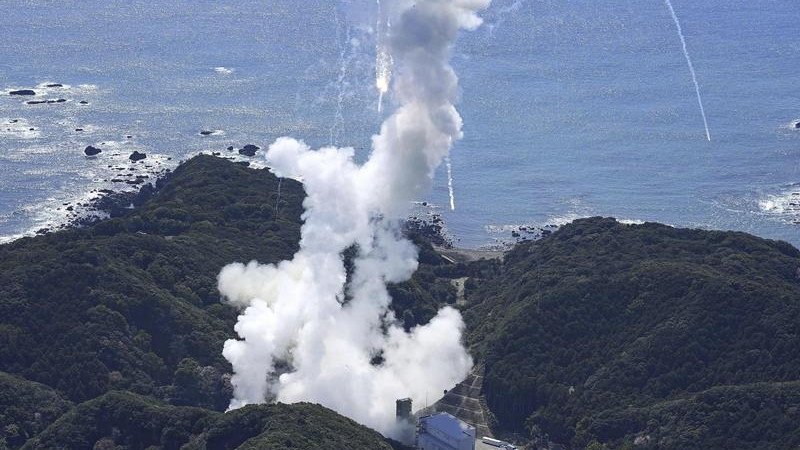Japan's Space One Kairos rocket explodes after lift-off

Japan’s Space One’s small, solid-fuelled Kairos rocket has exploded shortly after launch on its inaugural trip as the firm tried to become the first Japanese company to put a satellite in orbit.
The 18m, four-stage solid-fuel rocket exploded seconds after lifting off just after 11.01am on Wednesday, leaving behind a large cloud of smoke and a fire near the launch pad, visible on a local media livestream of the launch on the tip of Kii peninsula in western Japan.
Kairos carried an experimental government satellite that could temporarily replace intelligence satellites currently in orbit if they fell offline.
Sign up to The Nightly's newsletters.
Get the first look at the digital newspaper, curated daily stories and breaking headlines delivered to your inbox.
By continuing you agree to our Terms and Privacy Policy.There was no immediate indication of what caused the explosion, or whether there were any injuries. Pads typically have no people anywhere nearby during a launch.
Space One had initially planned the launch for Saturday but postponed it after a ship entered the nearby restricted sea area.
Although Japan is a relatively small player in the space race, the nation’s rocket developers are scrambling to build cheaper vehicles to capture booming demand for satellite launches from its government and global clients.
Tokyo-based Space One was established in 2018 by a consortium of Japanese companies: Canon Electronics, the aerospace engineering unit of IHI, construction firm Shimizu and the state-backed Development Bank of Japan. Two of Japan’s biggest banks, Mitsubishi UFJ and Mizuho, also own minority stakes.
Shares in Canon Electronics fell more than 8.0 per cent after Wednesday’s failed launch.
Space One wants to offer “space courier services” to domestic and international clients, aiming to launch 20 rockets a year by the late 2020s, its president Masakazu Toyoda said. Although the company delayed Kairos’ inaugural launch window four times, it said orders for its second and third planned trips have been filled, including by an overseas customer.
Space One does not disclose Kairos’ launch costs, but company executive Kozo Abe said it is “competitive enough” against American rival Rocket Lab.
Rocket Lab has launched more than 40 Electron small rockets from New Zealand since 2017 at roughly $US7 million ($A11 million) per flight. Several Japanese companies have used Electron for their missions, including radar satellite makers iQPS and Synspective, and orbital debris-removal startup Astroscale.
Last month, state-funded Japan Aerospace Exploration Agency (JAXA) successfully launched its new cost-efficient flagship rocket, the H3. JAXA completed a historic “pinpoint” moon landing this year, and the H3 is scheduled to carry about 20 satellites and probes to space by 2030.
In 2019, Interstellar Technologies conducted Japan’s first privately developed rocket launch with its MOMO series, although without a full-scale satellite payload.
Partnering with the United States, Japan is seeking to revitalise its domestic aerospace industry to counter technological and military rivalry from China and Russia.
The government last year promised “comprehensive” support for space startups with technology critical for national security, as it seeks to build satellite constellations to ramp up intelligence capabilities.
Japan’s defence ministry on Friday said it had struck a deal with Space One to boost its rockets’ payload by experimenting with fuel-efficient methane engines.
